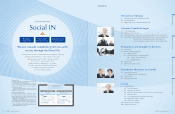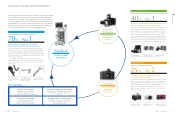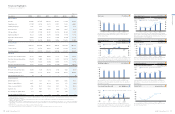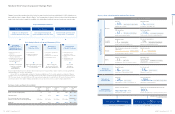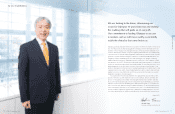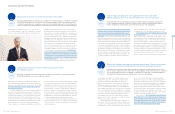Olympus 2015 Annual Report Download - page 14
Download and view the complete annual report
Please find page 14 of the 2015 Olympus annual report below. You can navigate through the pages in the report by either clicking on the pages listed below, or by using the keyword search tool below to find specific information within the annual report.
systems and disposable products for gastrointestinal endo-
scopes and even surgical endoscopes. You, President Sasa,
have stated that you have no intention of directly competing
with other manufacturers. Do you really believe that Olympus
can continue to operate under this business model over the
next 10 or 20 years?
Sasa: I do believe that we can continue to operate with this
model, although growth will slow if this all is we do. For this
reason, it is important that we branch out, leveraging the busi-
ness platform we have constructed to date in order to expand
into new fields in which we can win out over the competition,
such as the orthopedics and ENT fields. Making progress in
the Medical Business requires a great deal of time. Accordingly,
we decided to first examine the option of focusing investments
and resource allocation on those fields, and then clarify our
policies in the next corporate strategic plan. This, I feel, is the
approach Olympus should adopt in the future. We lack the
competencies necessary to acquire large numbers of compa-
nies and manage these effectively, as is done by our European
and U.S. rivals. Of course, we will utilize M&A activities as a
means to accomplish our objectives. Nevertheless, Olympus
will pursue growth while firmly rooted in the manufacturing
sector. I believe this type of growth to be the Company’s
essence. At the very least, we recognize that Olympus cannot
beat European and U.S. companies by mimicking them.
Rather, we must proceed while considering where Olympus’
strengths lie, and how we should build upon these.
endoscopes are different than digital imaging equipment, such
asultrasound, CT, and MRI scanners. The benefits of digital
imaging can be recreated to a certain degree regardless of
what company makes the equipment. For this reason, it may
be only natural for more affordable equipment to be chosen.
As there is a drive to limit medical expenses, this goes without
saying, unless a given piece of equipment features a substan-
tial advantage. Meanwhile, the endoscope field, as you
mentioned, may be the most resilient to this type of price
sensitivity. Endoscopes are an amalgamation of various tech-
nologies and expertise that have been brought together
through minute adjustments. This is a feat that not any
company can accomplish. As the drive to reduce medical ex-
penses limits capital expenditures by hospitals, it will become
increasingly difficult to increase the number of facilities using
Olympus products, and we therefore cannot hope to expand
our business purely through sales of capital products, by
which I mean existing systems. For this reason, we will focus
our efforts on helping hospitals reduce overall expenses
through improved efficiency. This efficiency will be realized by
enhancing certain parts of a hospital’s existing systems or in-
creasing the number of examination rooms in which these
systems can be used, for example. If operating rooms are able
to perform a greater number of procedures, it will mean greater
efficiency for the hospital. At the same time, such an increase
will also create business opportunities for Olympus as a greater
number of procedures leads to higher consumption of dispos-
able medical devices. Treatment fields are also expected to
expand going forward. Accordingly, we have formulated the
overarching plan of growing our business by strengthening our
lineup of endotherapy devices for use with energy devices and
endoscopes. Looking at the next 10 years, I believe that
Olympus will be able to continue growing by shifting the focus
of its business. This, and the recognition that this shift is some-
thing that must be undertaken, represent the Company’s
medium- to long-term standpoint.
Nakanomyo: From that standpoint, I think that endoscopes
have a great deal of potential as a business platform. Olympus
has stated its plans to invest in new businesses in the regener-
ative medicine and orthopedics fields. Whether in these fields
or the conventional imaging field, the endoscope business
platform will create opportunities to provide various devices
and disposable products.
Sasa: You are right on that point. In addition, endoscopes can
be used for early diagnosis, and then for conducting minimally
invasive therapies. As such, endoscopes can eliminate the
need for opening abdominal surgeries, which are accompa-
nied by heavy hospitalization costs, and thereby alleviate both
the financial and physical burden placed on patients. I do not
thinkanyone would oppose such a win–win situation.
Nakanomyo: Having accepted that explanation, I think the
next questions asked by the remaining 20% would be “What
about earnings in the short term?” and “How will the Imaging
Business be handled?” For this reason, if Olympus is able to
minimize the negative aspects of its operations, such as the
recent investigation by the U.S. Department of Justice, I think
you would be able to win over this remaining 20%, and have
them too looking forward to the future of Olympus.
Owaki: If you take the perspective of social responsibility,
rather than financial gain, then maybe the Company should
continue its camera operations in order to protect the interests
of customers who prefer using Olympus’ products. From the
perspective of competition, however, each company has its
strengths, and profit will not come easily even if the Company
targets niche markets. As an investor, I believe if the Company
intends to adopt a more realistic approach then the decision
should probably be made soon. It is my hope that Olympus
will become the type of company that focuses more on its
core businesses to practice management in an efficient
manner, a company that does not warrant debates about
itsImaging Business.
Yoshihara: The wave of mergers among European and U.S.
companies is resulting in the creation of increasingly larger
companies, which are realizing heightened cost competitive-
ness by leveraging sales-front synergies to reduce costs.
Olympus has expressed that its strategies do not entail
aggressively expanding scale. Given these trends, however,
there is concern as to whether or not the Company can
maintain its current level of competitiveness through these
strategies. I think overseas investors, in particular, might be
worrisome when considering the current state of the medical
equipment industry. I realize that Olympus has a one-of-a-kind
business model with endoscope operations that encompass
Opinions, Advice, and Hopes for Olympus
Owaki: Despite the various negative incidents that have sur-
faced, Olympus’ stock price is on the rise. I am convinced
this is because the market has highly evaluated the strength of
the Company’s Medical Business, which is founded on endo-
scopes. My hopes for Olympus involve removing the roots
ofconcern in the Medical Business, and then addressing the
Imaging Business. In this business even your new ideas have
been, in actuality, old ideas. Quite frankly, I do not feel that
sales of cameras to consumers is a necessary business for
Olympus. Another area needing improvement is how the
Company presents itself. The medical equipment business
contributes to a better existence for humanity, and you should
be proud of your involvement in this business. Make the
market understand that the future is promising and that your
course is correct, and then explain your targets, results, and
business strategies from this standpoint.
Nakanomyo: I think that you are completely correct about
what constitutes Olympus’ core strength. The analog aspects
of endoscopes are quite difficult to understand for people
outside of the Company. Perhaps this is something I will need
to learn at the upcoming plant tour*, as this is probably the
area in which Olympus is strongest. Moreover, this will most
likely remain an area of strength into the future, and today’s
discussion made me realize that I should pay more attention
tothis element of your business.
* Tours of Olympus endoscope plants in Aizu and Shirakawa in Fukushima Prefecture
where held in the week following this discussion.
Yoshihara: Olympus’ business is one that makes substantial
contributions to society, and this fact is something you should
advertise more. Many investors have already stated this
opinion. Endoscopes have saved tens of thousands of lives
byfinding cancers in their early stages. You should have more
pride in Olympus’ business and its products. There are not
many Japanese medical equipment manufacturers that can
compete on the global stage to the extent that Olympus does.
I want you to develop your operations with a sense of confi-
dence in the Company’s business and its people, and to transmit
messages to this extent. This is an opinion I have heard from
others as well, and I hope that you will take it to heart.
Sasa: Thank you for joining us today. I hope to draw on your
valuable input and insight in management to create an
Olympus that lives up to your expectations.
Discussing Olympus’ Ideal Form
25
OLYMPUS Annual Report 2015
24 OLYMPUS Annual Report 2015
Olympus’ Growth Strategies



